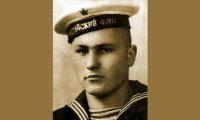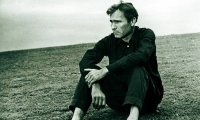 Vasily Makarovich Shukshin was born on July 25, 1929, into a peasant family in the village of Srostki, Altai Krai. His father, Makar Leontievich (1912–1933), was arrested and executed by decision of a special troika in April 1933 when Vasily was not yet four years old. The boy's upbringing was taken over by his grandfather Leonty Pavlovich Shukshin (1882–1960) and his mother Maria Sergeevna (1909–1979), and later by his stepfather Pavel Nikolaevich Kuksin (1905–1942), who died at the front.
Vasily Makarovich Shukshin was born on July 25, 1929, into a peasant family in the village of Srostki, Altai Krai. His father, Makar Leontievich (1912–1933), was arrested and executed by decision of a special troika in April 1933 when Vasily was not yet four years old. The boy's upbringing was taken over by his grandfather Leonty Pavlovich Shukshin (1882–1960) and his mother Maria Sergeevna (1909–1979), and later by his stepfather Pavel Nikolaevich Kuksin (1905–1942), who died at the front.
From childhood, the future writer was accustomed to hard peasant labor: he helped the elders with the household and worked in the fields. His only solace was reading, to which he became addicted early on. After completing seven years of school in his native Srostki in 1943, Vasily enrolled in the Biysk Automobile Technical School, where he studied for two and a half years but had to leave, joking that it was due to "not understanding the behavior of pistons in cylinders." In 1947, he left his homeland to seek work "on the mainland" – in Central Russia.
 Vasily worked in factories and construction sites in Kaluga, Vladimir, and the Moscow region, trying various jobs such as laborer, loader, painter, and rigger. In 1949, he was drafted for military service, which he served in the Baltic and Black Sea fleets. At the end of 1952, senior radio operator Vasily Shukshin was discharged due to a discovered stomach ulcer, and he returned to his native Srostki. In the spring of 1953, Vasily passed exams externally for the high school course, and with the assistance of local authorities interested in retaining young personnel in the village, he was appointed acting director of the evening school.
Vasily worked in factories and construction sites in Kaluga, Vladimir, and the Moscow region, trying various jobs such as laborer, loader, painter, and rigger. In 1949, he was drafted for military service, which he served in the Baltic and Black Sea fleets. At the end of 1952, senior radio operator Vasily Shukshin was discharged due to a discovered stomach ulcer, and he returned to his native Srostki. In the spring of 1953, Vasily passed exams externally for the high school course, and with the assistance of local authorities interested in retaining young personnel in the village, he was appointed acting director of the evening school.
In 1954, a decisive turn occurred in Vasily Shukshin's biography: he decided to obtain higher education and went to Moscow to enroll in an institute. It is known that the young Siberian applied to three places simultaneously – the Literary Institute, the All-Union State Institute of Cinematography, and the Historical-Archive Institute. Passing the exams for the latter two, Shukshin chose cinematography and began studying in the directing department under the famous M.I. Romm. Among his classmates were A.A. Tarkovsky, A.N. Mitta, Y.A. Fajt, and A.V. Gordon. Despite having to "bite into" the knowledge – due to the lack of general education – Shukshin made rapid progress.
 According to eyewitnesses, two distinct poles formed in the course: some students concentrated around Andrei Tarkovsky, and others around Vasily Shukshin, who unofficially competed. During his student years, Shukshin became seriously involved in writing. His stories about peasant life appeared in the magazines "Smena" and "Oktyabr." Simultaneously, he made his debut in the big cinema – in 1958, Shukshin starred in the leading role in M.M. Khutsiev's film "Two Fyodors."
According to eyewitnesses, two distinct poles formed in the course: some students concentrated around Andrei Tarkovsky, and others around Vasily Shukshin, who unofficially competed. During his student years, Shukshin became seriously involved in writing. His stories about peasant life appeared in the magazines "Smena" and "Oktyabr." Simultaneously, he made his debut in the big cinema – in 1958, Shukshin starred in the leading role in M.M. Khutsiev's film "Two Fyodors."
In 1964, Shukshin made a name for himself not only as an actor but also as a director. The film "There Is Such a Lad" garnered audience interest and positive critical responses, and the performer of the main role, Leonid Kuravlyov, was recognized as one of the best actors of the year. In 1965, when Shukshin wrote the novel "Lyubavins" – his first attempt at large forms – he was accepted into the Writers' Union.
From the late 1960s, Shukshin's creative career skyrocketed. His films, roles, and books consistently found devoted admirers, and his name became widely known. Among his friends were writers V.I. Belov and V.P. Nekrasov, actor G.I. Burkov, and cinematographer Anatoly Zabolotsky. His films from the early 1970s, "Pechki-Lavochki" and especially "Kalina Krasnaya," only strengthened his authority. Shukshin's creative power grew, and he envisioned new goals, plans, and achievements ahead, but fate had other plans.
In his works, particularly in his stories, Shukshin adhered to a direction known as "village prose," which included V.A. Soloukhin, V.I. Belov, V.G. Rasputin, F.A. Abramov, and others. The main message of this informal movement was a return to traditional values, a search for truth in the age-old way of life, and a contrast between "urban" and "rural" morality. Shukshin, who had personally experienced the disdain for villagers from refined urbanites, protested against the simplified view of rural Russia in his work, preferring the inner criteria of a person over their external social status. He was interested in the person as such, not their position in society.
In his best stories, Shukshin avoided moralizing, and his characters freely discussed the most pressing issues. The author masterfully demonstrated the diversity of human types: the boastful drunkard, the reckless young daredevil, the generous man, the thoughtful master, and others. However, the central figure was always a special Shukshin type, the so-called "chudik" or "shizya." These characters had an indomitable spirit, a craving for the extraordinary, and a rejection of officialdom and mediocrity. Such were Nikolai Knyazev from the cycle of stories "Sketches for a Portrait," obsessed with the idea of a "purposeful state," Monya Kvasov from "The Persistent," crazy about creating a perpetual motion machine, Bronka Pupkov from "Mille Pardon, Madame!," who told everyone he met about his participation in an assassination attempt on Hitler, and others.
The vividness and uniqueness of Shukshin's characters puzzled critics: they argued and still argue about who this "chudik" is – a collective image of Ivan the Fool or a "representative of the laughing tradition of carnival literature," a Gogolian-Leskovian type, or a "natural person"? Without delving into the discussion, it can be asserted that regardless of the accuracy or fallacy of any view, Shukshin created a truly lively and memorable gallery of heroes.
Vasily Shukshin died on October 2, 1974, during the filming of director S.F. Bondarchuk's epic "They Fought for Their Country" due to a massive heart attack. The death occurred in the Volgograd region aboard the ship "Dunai," where the actors lived. According to Georgy Burkov's recollections, at around three o'clock in the morning, Shukshin went out on deck, clutching his heart. Validol did not help, and the ship's film crew doctor was not present – he had gone to a wedding.
Vasily Makarovich Shukshin was buried on October 7, 1974, at the Novodevichy Cemetery.


